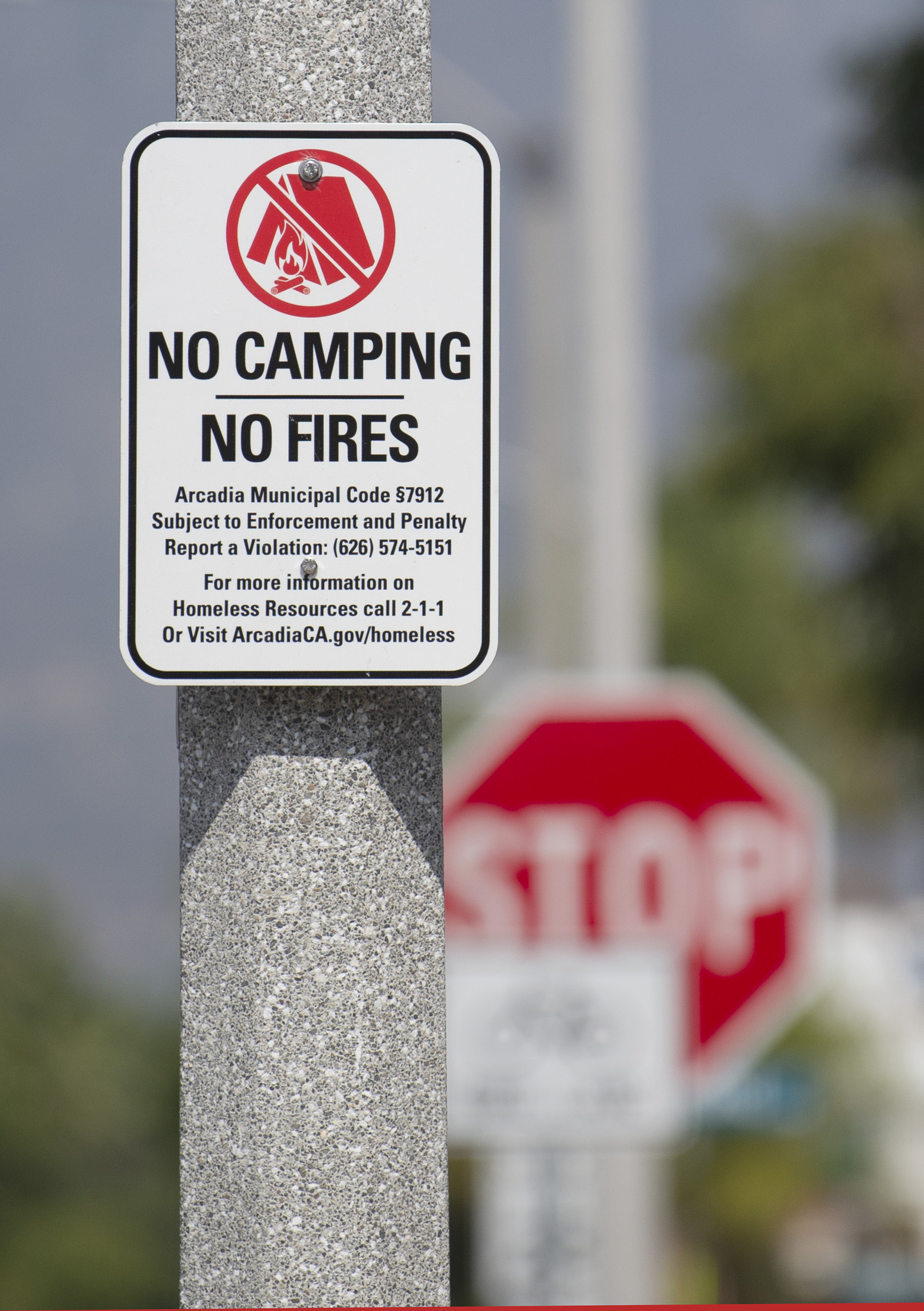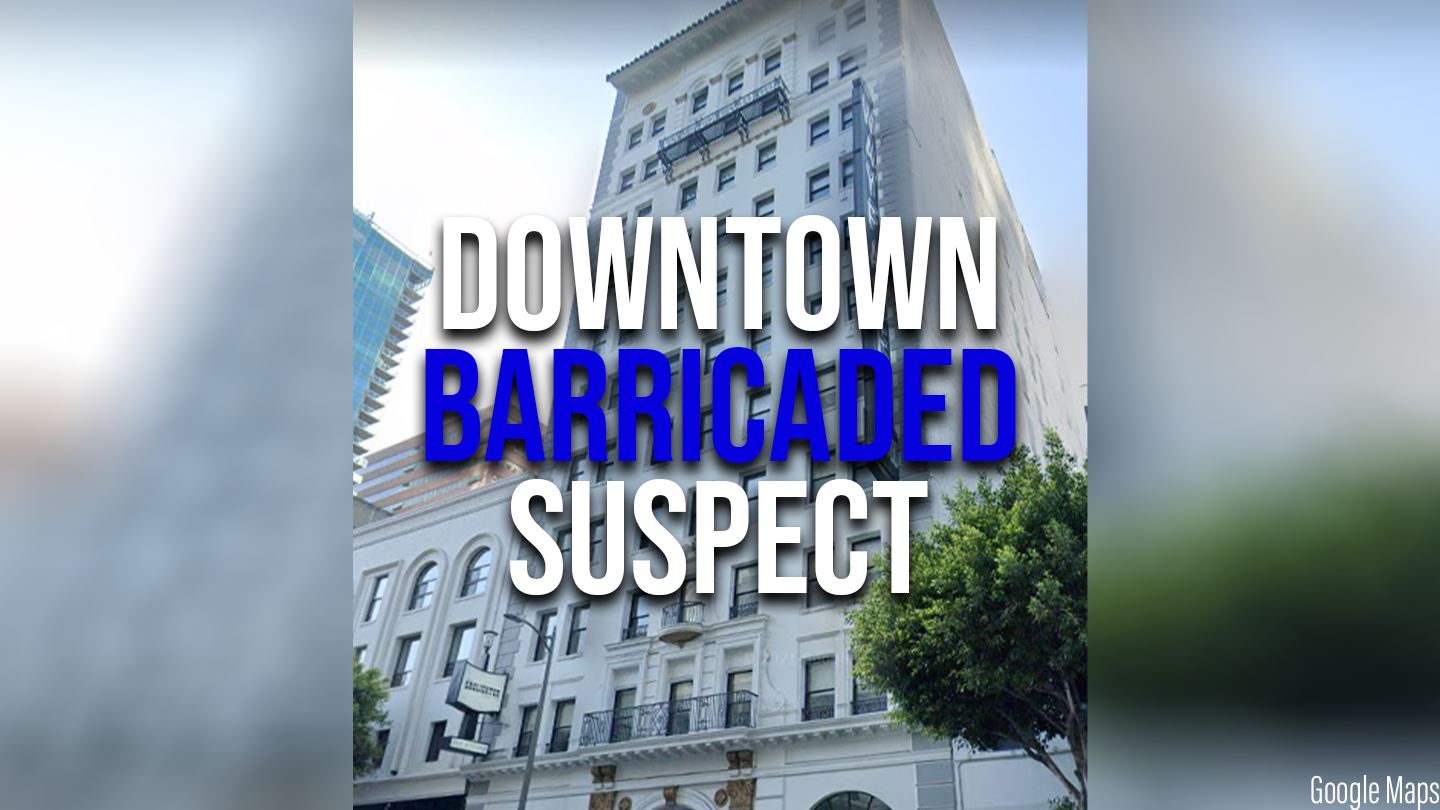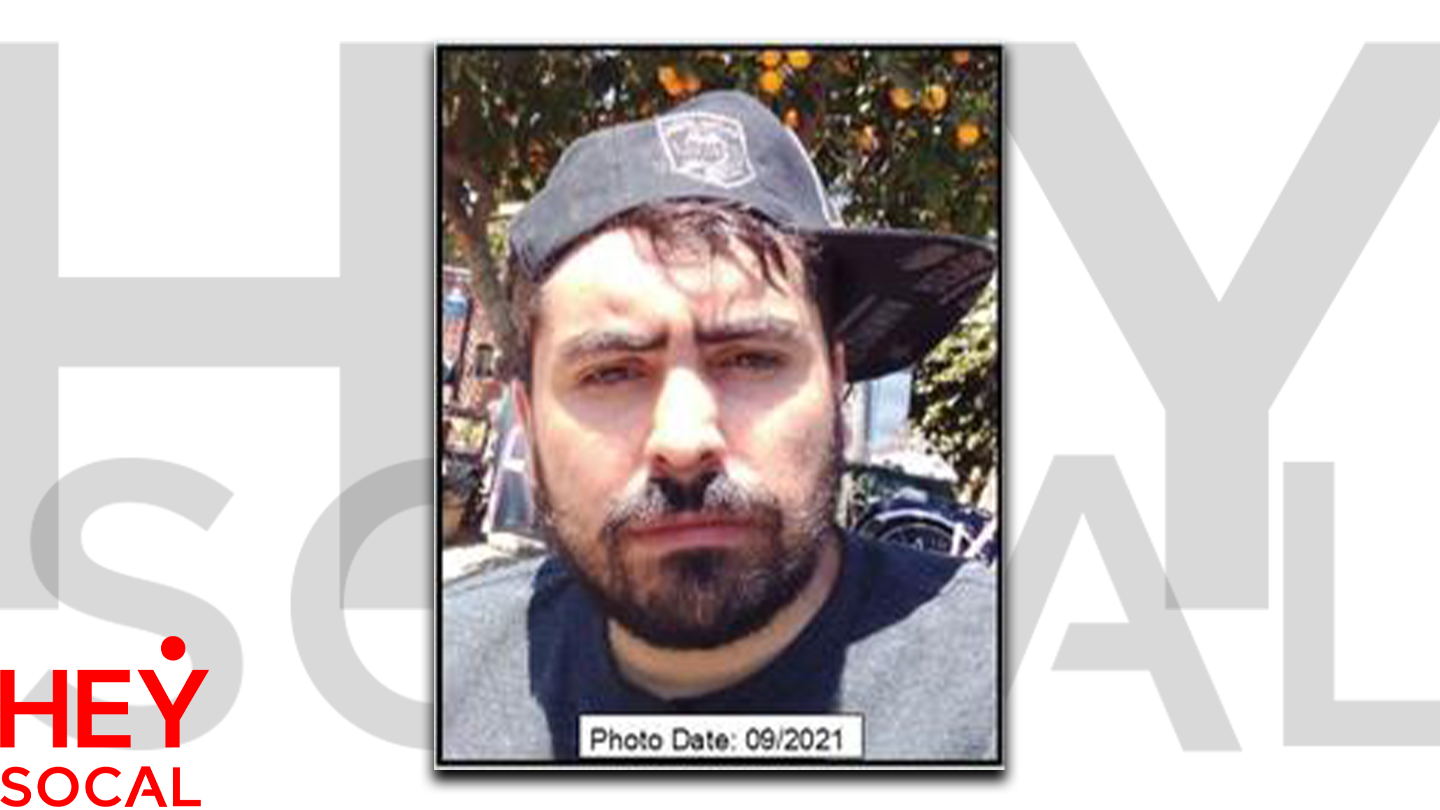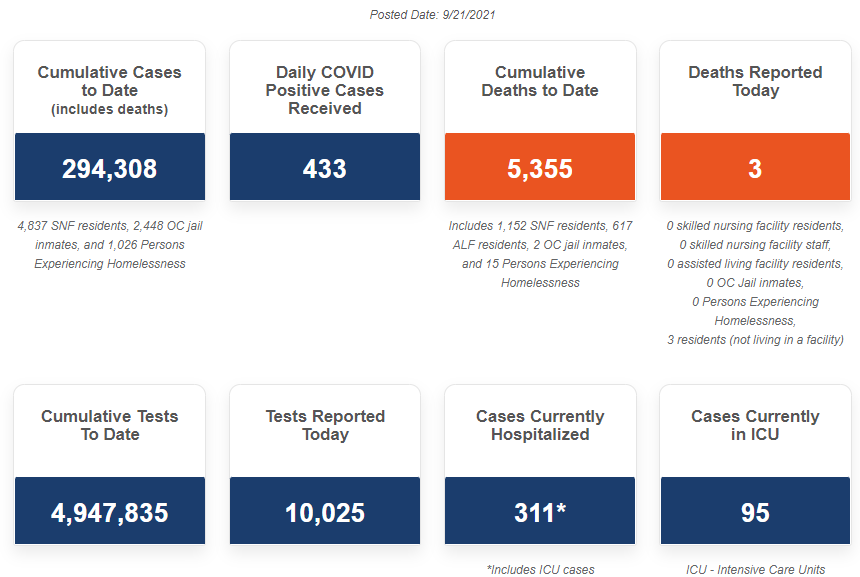Months have passed since the Arcadia City Council tabled the highly controversial tiny homes project proposal — which was designed to help the area’s homeless population of about 100 — after the overwhelming public outcry extended into protests outside councilmembers’ homes and city hall. The city has been “sweeping” up areas of concern, but the issue remains, albeit less visible.
A few weeks ago, the City of Arcadia installed 65 permanent “No Camping” signs embedded in concrete at city parks, high underpasses, city facilities and commercial areas such as downtown Arcadia on First Avenue.
Arcadia Deputy City Manager Michael Bruckner told Beacon Media that the 2018 Ninth Circuit Court decision in Martin v. City of Boise holds that cities cannot prohibit camping by necessity when there are no shelters available; however, the decision also allows cities to enact time, manner, and place restrictions. The city’s anti-camping ordinance, which was updated in 2021, makes accommodations for individuals experiencing homelessness that are camping by necessity, but does so in a way that is consistent with case law and includes restrictions on where, when and in what manner camping is allowed on public property.
The confusing part of the anti-camping ordinance has two parts. The first part says there is no camping anywhere in Arcadia, unless it is camping by necessity. The second part defines what it means to camp out of necessity and where camping is not allowed, even when necessary. If you’re confused, you’re not alone.
Then, at an Aug. 17 council meeting, city leaders passed a motion revising the public camping hours from 10 p.m. – 7 a.m. to 8 p.m. – 7 a.m. and to “add clarifying language prohibiting camping on all real property or lots associated with prohibited camping areas on public property.”
While confusing, the city is trying to accommodate residents and those who need shelter, but some residents are once again vocalizing their disapproval. An online petition has been started requesting that city leader reverse their decision because the updated hours “will allow all personnel to set up and sleep in the tents for 11 hours while families and children are still using the public parks.”
Additionally, organizers of the petition are requesting that Arcadia implement restrictions similar to the City of Los Angeles, including prohibiting:
- obstruction of streets and sidewalks
- camping within 500 feet from schools, daycares, libraries, and public parks
- camping within 1,000 feet from homeless shelters/services
- camping within 500 feet from overpasses, underpasses, and bridges
- camping within 5 feet of a building entrance/exit and 10 feet from driveways.
The current ordinance within Arcadia city limits allows an individual to camp “for necessity” from 10 p.m. to 7 a.m, with the update this will now be from 8 p.m. to 7 a.m. Further, the ordinance stipulates that any camp facilities must be taken down on any public property outside those hours (except during rainfall). A person is also prohibited from obstructing “access to a street, sidewalk, park playground, public utility, public property, or other public right-of-way open for pedestrian travel of governmental use” by sitting, lying or sleeping or by placing personal property within 10 feet of any “operational or utilizable, entrance, exit, driveway, or loading dock” or by creating a barrier “upon city owned trees, light poles, fences, equipment or other public facilities.”
The ordinance also prohibits camping within 500 feet of bridges and highway underpasses and overpasses, and at playgrounds, park picnic areas (including tables, bleachers, benches and pavilions), Arcadia Transit Plaza, City Hall, Arcadia Public Library, Gilb Museum, Museum Education Center, Arcadia Community Center, Arcadia Recreation Office, Arcadia Par 3 Golf Course, landscaped areas, freeways onramps and off-ramps, vey high fire severity zones, and within 25 feet of certain city designated zoning. A copy of the city’s ordinance can be found at https://bit.ly/3ubdMUk.
On its website, the city blames federal law for the current situation: “Under the federal law, if we don’t have a shelter locally to provide a bed for those homeless people, we cannot prevent them from sleeping on the streets. If they have no place to go, we have to let them stay here. That law has led to the growth in homelessness you see everywhere now, including Arcadia. That has a negative impact on Arcadia businesses and residents right now and what we’re trying to fix.”
The city says it wants to “fix the problem” while it still can. “We already have people on our streets doing drugs and committing small crimes as part of trying to survive. We are trying to get them off the streets to protect our community. While we have no record of the homeless in Arcadia committing any serious crimes, and in general they wish to be left alone and keep to themselves, we do still deal with the homeless issue every day,” according to a statement on the city website. “Our officers and paramedics are spending more and more of their day responding to calls related to the homeless in Arcadia. While we have to allow the camping, we don’t have to allow crime on our streets and our officers respond when a crime is reported or seen. Also, our paramedics respond when someone is medically or mentally in need. What used to be a very small part of their jobs is becoming a big part of their day. The same goes with our Public Works staff, who are cleaning up more and more campsites with trash, bodily waste, needles, graffiti, and the like.”
We contacted city officials for comment on issues surrounding homelessness in Arcadia. Councilwoman April Verlato told Beacon Media: “This type of ordinance in no way addresses the core issue of homelessness — people living on the streets, parks or underpasses in Arcadia. The people are still unsheltered and unhoused, just on a different block.”
Verlato also stated, “We have a large population of unhoused living in Downtown Arcadia and although they can no longer sleep in front of the stores along First and Huntington, they can still sleep just one block away at the park.”
Verlato, who has been a strong proponent of the tiny homes project, added “Providing shelter for the unhoused provides a much more successful solution to addressing homelessness. Shelter in Arcadia would mean that people would actually not be on the streets, but in shelter. And with the right type of shelter that provides services, such as mental health counseling, medication dispensing, job training, housing navigation, people will have someplace safe to sleep while they wait for permanent supportive housing to open up.”
She explains why a permanent location helps case managers providing access to resources. “One of the challenges I see our case managers having in connecting with those living on the streets in Arcadia is it can be difficult to find people on a consistent basis. Many times, I report where I see someone camping in the wash and the case manager goes out there only to find the tent/campsite empty. They have to go back several times before catching the person at the right time when they are there with their stuff,” Verlato stated. “Sweeps,” she added, do “nothing more than make it that much more difficult for our case managers to find the people that need their help.”
“I believe that City Council is giving the false impression to its residents that this ordinance will solve our problems with homelessness, “Verlato continued. “But, in my opinion, it will not. This just moves the problem from one block to another.”
According to Verlato, her district has the highest concentration of unhoused due to the wash, transit plaza and commercial district at First and Huntington. The councilwoman says she sees “the unhoused camp in the wash under a freeway or street overpass, public works from time to time ‘sweep’ the encampments, but can only do one area at a time due to limited resources, and then the people at the encampment where the sweep is happening just move a few blocks down or up the wash to the next overpass. The two primary spots in my district are 1st and Foothill, then 2nd and Colorado. Sometimes, they move further down into Monrovia for a few weeks, but then slowly come back.”
During a four-hour, somewhat heated, council meeting Tuesday, it became increasingly clear that the city is still very divided on any tiny homes project to help the estimated 106 unhoused residents in the area. Essentially, many residents believe unhoused individuals need to live somewhere, but “not in my back yard.”
Councilman Tom Beck felt the 10 p.m. ordinance was unfair. “I don’t want homeless people being able to camp all over the place. Tiny homes are at least one answer,” he said. Changing the hour to set up camp doesn’t really make much sense as the homeless don’t just suddenly appear, Beck said.
Verlato thanked those in the community for being respectful but said “a tool chest of programs” is the best solution with the tiny home project a part of it.
“It’s not just a roof overhead. Yes, we need more services, diversion and job training. The homeless are equally entitled to enjoy our parks. But we do need tiny homes. The problem is not going away. It’s a complex issue,” Verlato said. Verlato has been the recipient of protests outside her house for her position on the issue.
Roger Chandler, speaking by telephone, said that he’s had discussions with the Sheriff’s office about patrolling the Gold Line station in Arcadia where some homeless individuals seek to camp. Chandler said he feels there are some homeless who are “bad actors” and “violent” and “the station is often surrounded by vagrants.” Chandler continued to say, without evidence, that the city’s flood control is fraught with ex-cons and drug dealers.
While no decisions were ultimately made, the city will reach out in the next few months to see how effective the new camping ordinance might be with the help of the city case workers and police.






